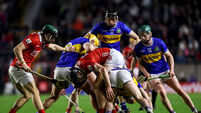Drug dealer informant blew whistle on airport bomb plot
A convicted drug dealer who agreed to pose as a potential terrorist among a shadowy group accused of plotting to blow up John F Kennedy International Airport secretly fed information to US investigators in exchange for a lighter sentence.
His surveillance trips to the New York airport with the suspects, travels abroad to meet supporters and assurances he wanted to die as a martyr in the attack on an underground jet fuel pipeline gave counter-terrorism agents insight and evidence that was otherwise unattainable.














